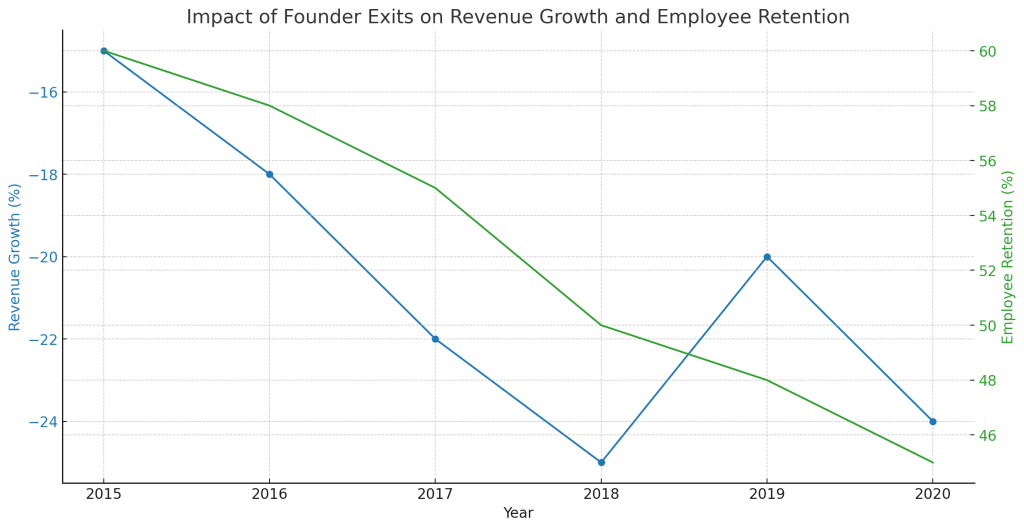Why Celebrating Founder Exits is on Average Like Cheering for the Captain Who Abandoned Sinking Ship
In the startup world, founder exits are often treated like epic victories. Headlines roar about multi-million-dollar buyouts, and founders are paraded as heroes. But let’s pause and think—are we celebrating the right thing?
An exit usually means a founder sells their company to private investors or larger corporations. It’s seen as the ultimate goal—a jackpot moment. Yet, this perspective misses something crucial: exits, more often than not, mark the end of a journey, not the beginning of impactful ventures. In addition, more often than not, the multi-million or billion exit celebration media titles are often misleading, and numbers are far away from the truth.
The Real Downside of Exits
When founders exit, they often have inside information that things are not going well. This isn’t just about cashing in; it’s about cashing out before the ship sinks. Founders might know the company’s weaknesses and foresee challenges that outsiders can’t. By selling, they might be saving face and escaping blame for potential failures. The headlines of successful exits are often more about protecting reputations than celebrating genuine success.
Take Katerra, for example. This construction startup, backed by SoftBank, aimed to revolutionize the construction industry with prefab technology. It was celebrated for its rapid rise and massive funding, reaching valuations that seemed sky-high. However, behind the scenes, financial mismanagement and operational inefficiencies were rampant. After raising $1.5 billion, Katerra’s collapse became a stark reminder that not all that glitters is gold (CB Insights).
Founders Who Stay
While some founders exit for the big payday, many stick around because they love what they do. They’re passionate about their mission and their company’s future. Psychology studies show that people love their jobs when they are successful. If that’s true, why would founders sell something they love? Often, companies are already in trouble when they are sold, but we don’t know that as they are private and not required to report. Exiting while the going’s good can sometimes mean they’re cashing out before the ship hits the iceberg.
Studies support the idea that happiness at work leads to success. Happy employees perform better, receive more favorable evaluations, and are less likely to burn out or quit their jobs. Longitudinal research has found that happier people are more likely to find and keep satisfying jobs, indicating that happiness often precedes and facilitates career success (Psychology Today).
The Real Heroes
We should be celebrating value creation—building companies and products that solve real problems, improve lives, and contribute to the economy. Companies that focus on creating value are more likely to make a lasting impact. They invest in innovation, customer satisfaction, and sustainable practices that benefit society in the long run. Value-driven companies prioritize sustainable growth. They build business models that can weather economic fluctuations and remain resilient over time. They provide meaningful employment, foster innovation, and can drive social change through their products and services.
Let’s shift our focus from exits to value creation. Celebrate the founders who stay because they believe in their vision and mission. Celebrate the creation of amazing companies and products, and the enduring value they bring to our world. This change in perspective will not only foster a healthier entrepreneurial ecosystem but also contribute to a more sustainable and impactful economic future.

This chart can be interpreted in two ways. Some might say it shows that founders were the driving force behind previous growth, the unsung heroes who kept the ship sailing smoothly. But let’s be honest, it could also mean they saw the iceberg ahead and decided it was time to hop onto the nearest lifeboat. The reality? Maybe the company was never that solid to begin with. Perhaps it was more about hype than about great products that made the world a better place.
So, let’s celebrate the builders, the ones who stick around to see their vision through. After all, we wouldn’t want to end up like that startup founder who sold his company for a fortune and then went to buy an island. Turns out, it was the same island his company sank on—talk about a sunk cost fallacy!
